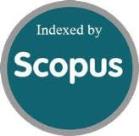Using Text Mining to Extract Issues for School: an Empirical Study of the Social Platform-Dcard
Keywords:
text mining, big data, social platform, sentimentAbstract
Nowadays, social network within sentiment analysis has become the main trend in text mining domain. There are many platforms have been analyzed, such as Facebook, Twitter, Instagram, and so on. In our manuscript, we attempt to extract the information about the sentiment polarity of messages (positive, neutral or negative) in a social platform “Dcard”. The users of Dcard are Taiwanese college students, and anonymous post is being used this in social platform, therefore, the user can express their opinion more freedom. We use Dcard to the sentiment polarity of messages in extract the information about the school; moreover, the school could get the feedback from this finding to improve their policy. In this paper, we used python to scrap the web page, and the sentiment lexicon would be built.
References
S. W. Wu, “Applying text mining technique to analyze the software quality characteristics of mobile games,” In department of industrial management, National Pingtung University of Science and Technology, pp. 1-49, 2013.
X. Z. Chang and Y. M. Li, “Using text mining to predict personality based on social behavior,” 2012.
R. S. Baker and K. Yacef, “The state of educational data mining in 2009: a review and future visions,” Journal of Educational Data Mining, vol. 1, no. 1, pp. 3-17, 2009.
Y. H. Tseng and Y. I. Lin, “The application of content mining techniques to the analysis of educational evaluation research trends,” Journal of Research in Education Sciences, vol. 56, no. 1, pp. 129-166, 2011.
G. van Rossum, Python, https://zh.wikipedia.org/wiki/Python#.E5.8F.82.E8.80.83.E6.96.87.E7.8C.AE, 1991.
C. Y. Jian, “Dcard,” https://www.dcard.tw/, 2011.
C. M. Young, “Applies by text mining to the support systems for coding ICD-9-CM —a study of admission note and discharge summary,” Taipei Medical University Information Management, pp. 1-68, 2004.
J. D. Kim, T. Ohta, Y. Tateisi, and J. Tsujii, “GENIA corpus—a semantically annotated corpus for bio-textmining,” Bioinformatics, vol. 19, pp. i180-i182, 2003.
M. Hall, E. Frank, G. Holmes, B. Pfahringer, P. Reutemann, and I. H. Witten, “The WEKA data mining software: an update,” ACM SIGKDD explorations newsletter, vol. 11, no. 1, pp. 10-18, 2009.
Y. H. Tseng, “Research and development on automatic information organization and subject analysis in recent decades,” Journal of Educational Media and Library Sciences, vol. 51, pp. 3-26, 2014.
A. Ortigosa, J. M. Martin, and R. M. Carro, “Sentiment analysis in Facebook and its application to e-learning,” Computers in Human Behavior, vol. 31, pp. 527-541, 2014.
Downloads
Published
How to Cite
Issue
Section
License
Submission of a manuscript implies: that the work described has not been published before that it is not under consideration for publication elsewhere; that if and when the manuscript is accepted for publication. Authors can retain copyright of their article with no restrictions. Also, author can post the final, peer-reviewed manuscript version (postprint) to any repository or website.

Since Oct. 01, 2015, PETI will publish new articles with Creative Commons Attribution Non-Commercial License, under The Creative Commons Attribution Non-Commercial 4.0 International (CC BY-NC 4.0) License.
The Creative Commons Attribution Non-Commercial (CC-BY-NC) License permits use, distribution and reproduction in any medium, provided the original work is properly cited and is not used for commercial purposes



